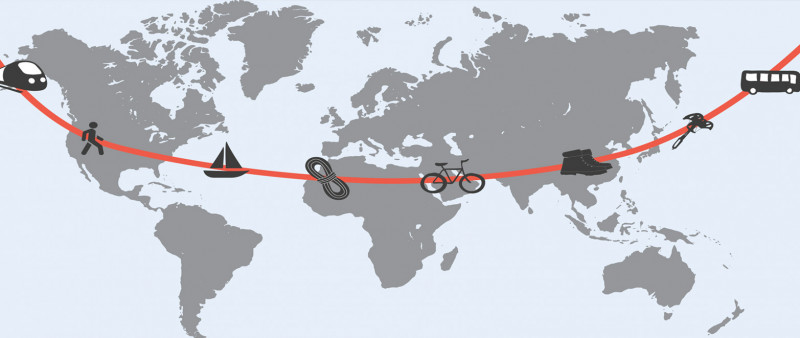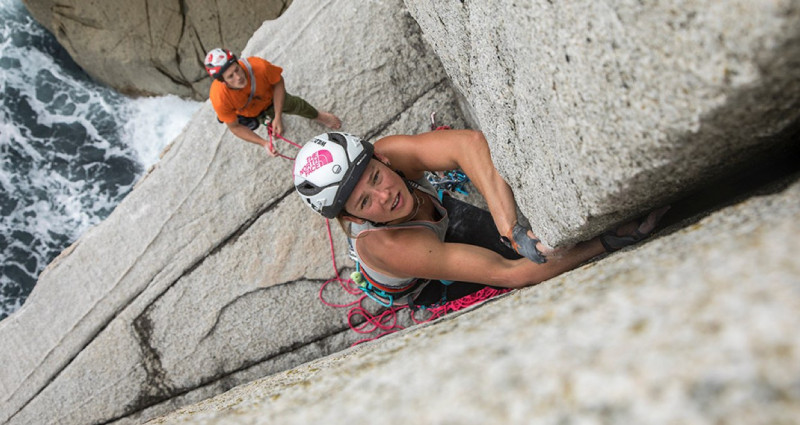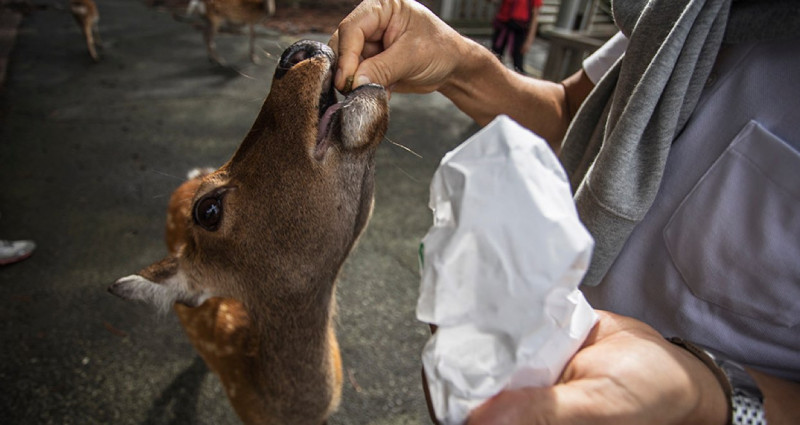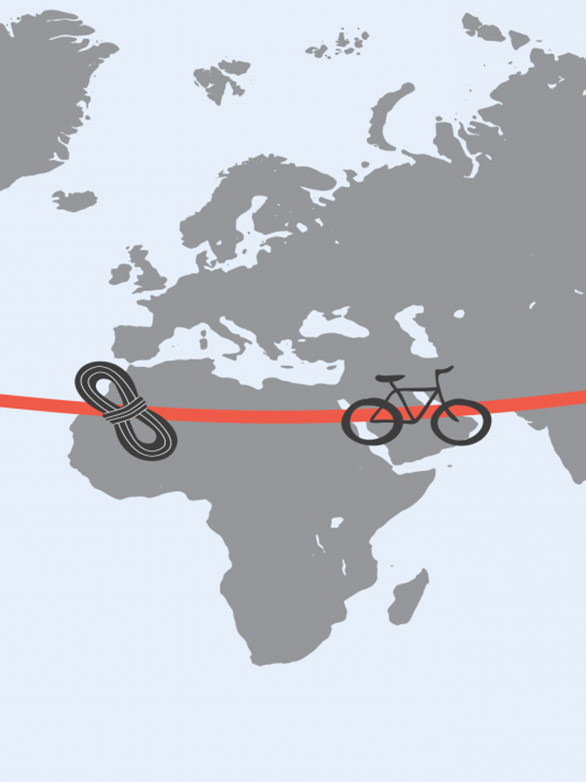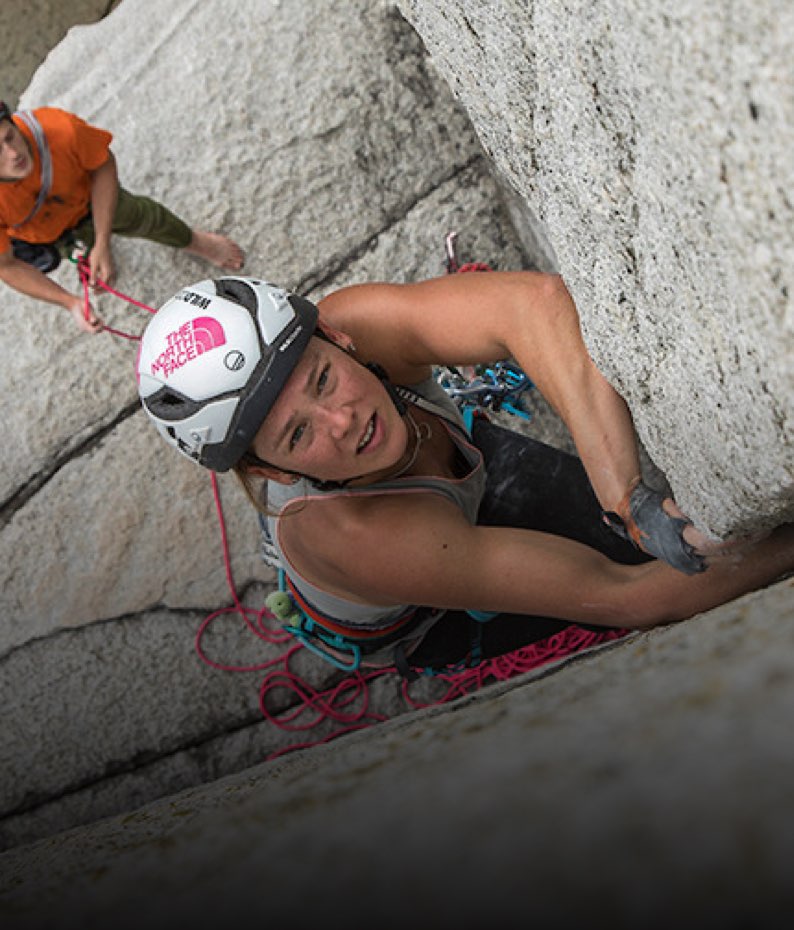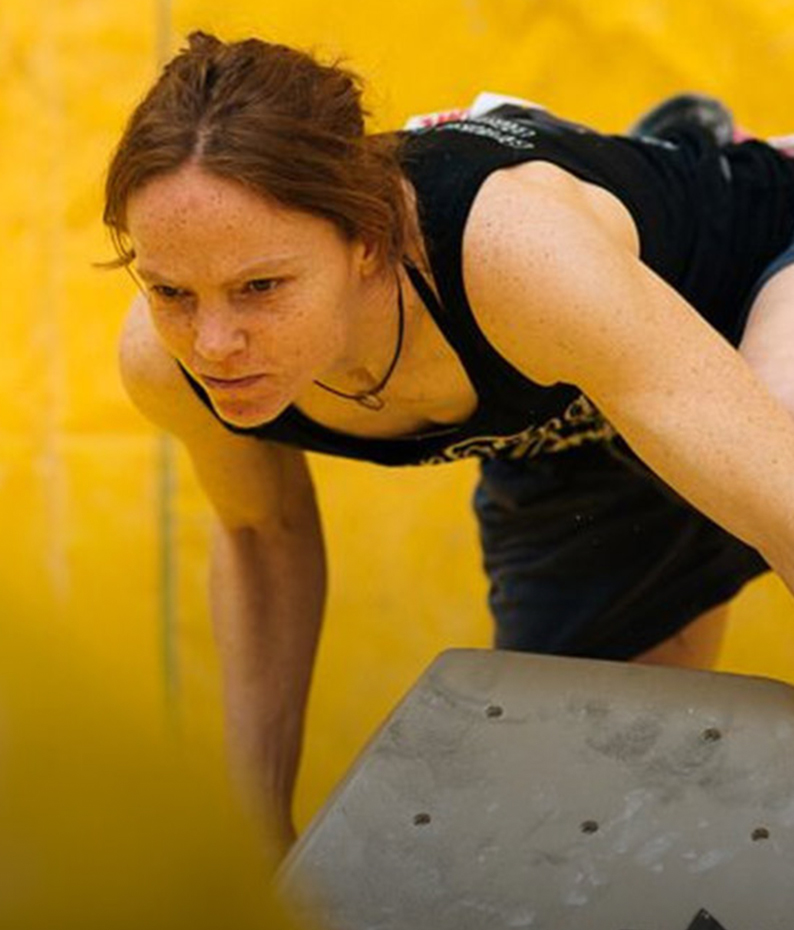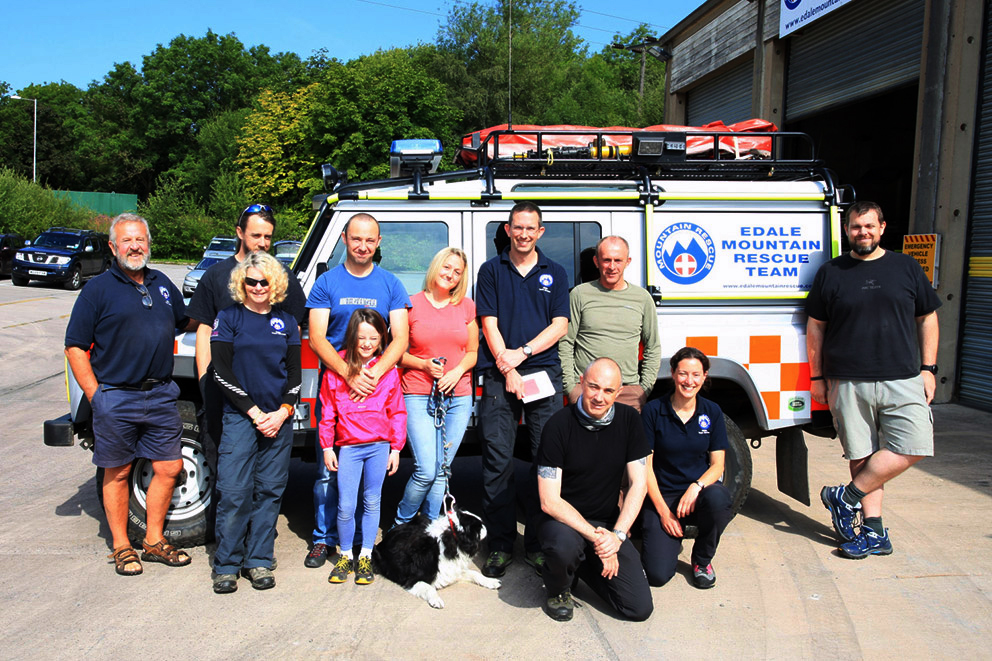SLOW TRAVEL
UN APPROCCIO CONSAPEVOLE DAL PUNTO DI VISTA AMBIENTALE, PER LA PRATICA DELL'ALPINISMO IN TUTTO IL MONDO
Rallenta il passo – Immergiti nella meta – Viaggia consapevolmente Slow Travel è il nuovo approccio all'arte del viaggio.
Benvenuti a Slow Travel
Come scalatori ci rendiamo conto che viaggiare rappresenta una grossa fetta della nostra vita: nuove rupi, nuove vie, elenchi di spunta globali, sono tutti parte di ciò che siamo. È importante anche per Wild Country e crediamo che lo sia per coloro che viaggiano per scoprire culture differenti, modi diversi di vivere e conoscere l'umanità in prima persona. Viaggiare arricchisce la vita, spezza le barriere, crea diversità e tolleranza.
Sappiamo tuttavia che viaggiare ha un impatto sull'ambiente e vogliamo cambiare il modo in cui lo facciamo. Vogliamo fornire delle risorse così che gli altri scalatori abbiano un approccio diverso al viaggio, confrontandoci tutti con il fine di “viaggiare con lentezza”.
Dove tutto ha avuto inizio
Quando i nostri amici e atleti James Pearson e Caroline Ciavaldini di Once Upon A Climb vennero da noi con l'idea di fare un viaggio alternativo ed eco-compatibile, passammo subito dall'alpinismo a innumerevoli conversazioni su Slow Travel.
La loro esperienza come alpinisti professionisti ha consentito a James e Caroline di viaggiare per il mondo, scalando in quasi tutti i continenti. Ciò ha dato loro l'opportunità di vedere in prima persona alcuni dei maggiori cambiamenti verificatisi a livello ambientale. Queste nozioni, puntellate dagli studi in biologia e scienze dell'educazione di Caroline, li ha portati a ripensare il modo in cui viaggiavano: influenzando la pianificazione dei viaggi e motivandoli a rivolgersi a Mossy Earth, un servizio privato di controbilanciamento dell'impronta ecologica, per aiutarli nei loro viaggi.
Tuttavia, per il loro progetto a Ordesa in Spagna, volevano prendere una strada completamente differente. Considerando il piano di James e Caroline di traversare i Pirenei in bicicletta e scalare El Ojo Critico, una via 8a di 400 m, vorremmo presentarvi Slow Travel, un ethos per Wild Country e un modo di vivere per Once Upon A Climb.
L'ethos Slow Travel
Rallenta il passo – Immergiti nella meta – Viaggia consapevolmente
Slow Travel è un modo di viaggiare consapevole a livello ambientale. Non elimina il viaggio in sé, non significa nemmeno eliminare l'uso dell'aereo o dell'auto. È piuttosto essere attivamente consapevoli nel pianificare i viaggi, trovando modi per ridurne l'impronta ecologica. Significa compensare i viaggi attorno al globo con altri più vicini a casa, utilizzando trasporti alternativi e portando con sé abitudini eco-compatibili ovunque si vada.
Comporta inoltre rallentare il viaggio e immergersi nella meta. Capire la cultura, capire l'ambiente circostante, cambiare i propri ritmi.
Dritte Slow Travel
Si tratta di una risorsa, in continuo ampliamento, per scalatori e viaggiatori di tutto il mondo.
Concediti tempo in abbondanza
Il viaggio fa parte dell'esperienza, perciò concediti tempo in abbondanza per godertelo. Questo non comporta necessariamente un numero imprecisato di giorni di vacanza, quanto semmai darsi il tempo, all'andata o al ritorno, di assaporare il viaggio, invece di correre verso quel posto iconico che si vuole scalare.
Rivedi la pianificazione dell'itinerario
L'intero itinerario è parte del viaggio. Invece di precipitarti verso un solo punto, pianifica un itinerario che ti consenta di vivere luoghi, persone e culture diverse lungo il percorso.
Immergendoti nell'esperienza, si dissolve il concetto dei giorni di viaggio, facendolo sembrare più lungo.
Prendi in considerazione la spedizione anticipata dell'attrezzatura pesante
Spedire in anticipo verso la meta finale gli oggetti pesanti e ingombranti, come l'attrezzatura d'arrampicata, spalanca nuove opzioni di viaggio. Girare in bici diventa fattibile, treni e pullman più rilassanti e aprirsi alle esperienze di viaggio risulta più facile.
Anche se potrebbe sembrare meno eco-compatibile, l'impronta ecologica si basa sul peso, perciò, senza dover aggiungere attrezzatura in eccesso alla tua spedizione, userai la stessa quantità di carburante. Un ulteriore vantaggio nel dover pagare le spese di spedizione significa che terrai conto di quel che risulta superfluo nel viaggio.
Informati sugli usi locali
Mentre prepari una nuova via, ti preoccupa la roccia marcia o le scalate dei run out? Fai ricerche oppure parla con i locali sugli usi dell'alpinismo in quelle zone. Riporre l'attrezzatura, inserire gli spit, o persino capire la motivazione dietro le diverse vie, ti assicurerà di scalare secondo le tradizioni locali.
Ciò ti aiuterà inoltre a capire meglio la storia delle vie, i motivi dietro le scalate e ispirarti a compiere arrampicate specifiche.
Ingaggia guide locali
Se viaggi in un paese all'estero, ingaggia le guide sul posto. Non solo ti aprirà maggiori opportunità di vedere dall'interno la scalata, le montagne e la comunità, ma aiuterai l'economia locale nell'area che visiti.
Sostenere la comunità degli scalatori locali è sempre importante, ma vogliamo sottolinearlo ulteriormente per quei paesi nelle prime fasi dello sviluppo. Cerca comunque di ingaggiare sempre guide qualificate.
Porta con te le bottiglie d'acqua
In aereo, chiedi all'hostess di riempirti la bottiglia, invece di offrirti una tazza nuova ogni volta.
Se ti trovi in una località in cui l'acqua è potabile, fai scorta e tieniti idratato.
Dovremmo bere circa 3 litri d'acqua al giorno, così farai in fretta ad arrivarci.
Porta con te una sacca per abiti riutilizzabile
Malgrado siano piccole, è sorprendente quanto spesso si usino: fare la spesa, comprare attrezzi, come borsa da portare a spalla in città. Scopriamo sempre nuovi usi a ogni viaggio.
Se le usi a casa, non dimenticare di metterne una in valigia per eliminare l'esigenza di borse di plastica.
Porta con te una saponetta biologica
Per il corpo, i vestiti, i piatti. Si sporcano tutti lungo la strada. Una saponetta biodegradabile o da campeggio è utilissima per lavare di tutto. Consigliamo le saponette perché non lasciano rifiuti di plastica come i liquidi o i gel.
Un altro vantaggio è risparmiare peso per articoli come il dentifricio.
Porta con te un piccolo panno di camoscio
Il sapone ce l'hai, ora dovrai asciugarti. Questi panni assorbono grandi quantità d'acqua, si asciugano rapidamente e non occupano spazio. Troviamo di continuo nuovi modi di usarli e si lavano facilmente in cammino.
Risorse Slow Travel
Si tratta di una risorsa, in continuo ampliamento, per scalatori e viaggiatori di tutto il mondo.
Mossy Earth - Neutralizza l'impronta ecologica del tuo viaggio
Da Mossy Earth crediamo che dovremmo tentare di tutto per ridurre la nostra impronta ecologica, prima che il controbilanciamento sia un'opzione, e che quest'ultimo non possa servire da scusa per continuare a inquinare. Se siamo in grado di dire, mano sul cuore, che abbiamo fatto il possibile per minimizzare l'impronta ecologica, allora il controbilanciamento deve essere visto come la successiva soluzione logica per annullare efficacemente il nostro impatto sull'ambiente.
Puoi controbilanciare ecologicamente un volo inevitabile a 2,00 £ l'ora, o un viaggio su strada a 2,50 £ ogni 1000 km. Per di più, i nostri alberi svolgono un ruolo cruciale nel ripristino degli ecosistemi e nel riportare la fauna selvatica in Europa. Piantiamo esclusivamente specie arboree native in progetti protetti di tutela della natura, per far sì che i tuoi alberi restino selvatici per sempre! Ti invieremo inoltre una foto e le coordinate GPS dei tuoi alberi, semmai volessi visitarli nel corso della tua prossima avventura alpinistica. Visita Mossy Earth per ulteriori informazioni.

SLOW TRAVEL
An environmentally conscious approach to climbing across the world.
Slow down your pace - Immerse yourself in a destination - Travel Consciously. Slow Travel is about taking a new approach to travel.
Welcome To Slow Travel
We realize as climbers traveling is a big part of our lifestyle new crags, new routes, global tick-lists this is all part of who we are. It is a big part of Wild Country too and we believe it is important for people to travel to experience different cultures, different ways of living, and learn humanities first-hand. Traveling enriches lives, breaks down boundaries, and creates diversity and tolerance.
We know travel has an impact on the environment though and we want to make a change in how we travel. We want to provide resources for other climbers to approach travel differently and open up the conversation for all of us to Travel Slow.
Where It All Started
When our friends and athletes James Pearson and Caroline Ciavaldini from Once Upon A Climb came to us with an idea to do an eco-friendly, alternative travel trip the conversation quickly spun from climbing into countless conversations on Slow Travel.
With James and Caroline’s experience as professional climbers, they have been able to travel the world, experiencing climbing on nearly every continent. This has allowed them the opportunity to see first-hand some of the major shifts taking place environmentally. These insights compounded by Caroline’s studies in Biology and Education led them to rethink how they travel; influencing how they plan for trips and motivating them to use Mossy Earth, a private carbon offsetting service, to help offset their travels.
But, for their next project in Ordesa, Spain they wanted to take a different route altogether. In light of James and Caroline's plan to bike over the Pyrenees mountains and climb El Ojo Critico; a 400m, 8a route we want to introduce you to Slow Travel, an ethos for Wild Country and a lifestyle for Once Upon a Climb.
The Slow Travel Ethos
Slow Down Your Pace – Immerse Yourself In A Destination – Travel Consciously
Slow Travel is an environmentally conscious way of traveling. It does not mean eliminating travel, it does not even mean fully eliminating taking planes, or automobiles. It is about being actively conscious when planning trips, finding ways to reduce your carbon footprint. It means balancing trips across the globe with ones closer to home, utilizing alternative transportation, and taking your eco-friendly habits with you wherever you travel.
It also means slowing down your travel and immersing yourself in a destination. Taking in the culture, taking in your surroundings, and changing your pace.
Slow Travel Tips
This is a resource that we will continue to expand for climbers and travelers around the world.
Give Yourself Plenty Of Time
The travel is part of the trip so give yourself plenty of time to enjoy. This does not mean you are required to have an infinite amount of holidays but give yourself time on either end of your destination to travel and enjoy instead of just rushing to an iconic location to climb.
Reconsider Your Route Planning
Your entire route is part of the trip. Instead of going as quickly as possible to one spot plan a route that allows you to experience different places, people, and cultures along the way. Immersing yourself in the experience of travel dissolves the idea of travel days making the entire trip feel longer.
Consider Shipping Your Heavy Hardware Ahead
Shipping heavy, bulky items like your climbing gear ahead to your final destination opens up travel options. Bikes become manageable, train and buses more relaxing, and being fluid in travel experiences easier. Although this might seem less eco-friendly your carbon consumption is based off weight, so without adding excess equipment to your shipment, you are using the same amount of fuel. The added benefit to paying shipping costs is you start by considering what is excess for your trip.
Learn The Local Ethics
Putting up a new route, concerned about chossy rock, or run out climbs? Do research or talk with locals about the customs for climbing in those areas. Stashing gear, placing bolts, or even understanding the motivation behind different routes can ensure you are climbing in alignment with the local traditions. This can also help you better understand the history of the routes, reasons behind climbs, and give you inspiration for specific climbs
Hire Guides Locally
If you are traveling to a foreign country hire your guides locally. Not only does this open you up to more opportunities of an inside view of the climbing, mountains, and community but you will be helping the community economically where you are visiting.
Supporting the local climbing community is always important but we emphasize this most in areas that are in the early stages of development. Always look to hire a certified guides though.
Bring Your Own Water Bottles
If you are on a flight have the attendants fill this instead of giving you a fresh cup every time.
If you are in a location where the tap water is safe to drink, fill up and hydrate.
We are supposed to consume about 3 liters of water per day so this adds up fast.
Bring A Reusable Cloth Bag
For such a tiny item we are always impressed how often these get used: food runs, gear shop stop, need a shoulder bag to walk through town. We continue to find new uses as we travel.
You use them at home, don't forget to toss one in for travel to eliminate the need for plastic bags.
Pack A Bar Of Bio-Soap
Bodies, Clothes, Dishes. They all get dirty along the way. A bar of biodegradable or camping soap is great to clean everything. We recommend a bar as it won't leave you with plastic waste like liquids and gels.
As an added bonus to saving weight share toiletries like toothpaste.
Bring A Small Chamois Towel
You have your soap now you need to get dry. These towels absorb a lot of water, dry fast, and pack small. We continue to find more and more used for them too and then can easily wash them along the way.
Slow Travel Resources
This is a tool that we will continue to expand for climbers and travelers around the world.
Mossy Earth - Carbon Offset Your Travels
At Mossy Earth we believe that every attempt should be made to reduce one's carbon footprint before offsetting is an option and that offsetting cannot be used as an excuse to continue polluting. If we can say, hand on heart, that we've done everything in our power to minimize our footprint, then carbon offsetting must be seen as the next logical solution to effectively negate our impact on the environment.
You can carbon offset an unavoidable flight for as little as £2.00 per hour or a road trip for £2.50 per 1000km. What’s more, our trees play a pivotal role in restoring key ecosystems and bringing the wilderness back to Europe. We plant only native tree species in protected conservation projects to ensure your trees stay wild forever! We’ll also send you a photo and GPS coordinates of your trees should you ever wish to visit them on your next climbing adventure. Visit Mossy Earth to learn more.
It was dry for the crossing, and after unpacking our bags at the shrine we bouldered on a nearby beach for 1 hour before the rain came. With so much rock to see and so little time, we hiked out anyway along the coast to search out potential lines. The rain became heavier, we became wetter, and after 4 soggy hours we returned to the shrine, hopes high but spirits low. We’d been preparing this trip since September 2015, putting the team together, finding funding from sponsors, organizing the local logistics, yet it would all be in vain if the weather didn’t brighten up.
A morning of rain gave us the excuse to sit down and record some interviews, though truthfully we had little to say as we’d done little climbing. Toru, ever the silent optimist finally dragged me out to the closest boulder spot during a break between two showers, and we were surprisingly able to climb! Toru lived up to his reputation of boldness and brilliance, making the first ascents of two of Kinkasan’s boldest and hardest problems. Finally things were looking up. The forecast was good for the following days, and group psyche could not have been higher. We began to plan our upcoming adventure and our first trip to the other side of the island – the area with the highest concentration of rock, and the biggest cliffs, but had to cut them short as bad news broke.
With my thirst for climbing temporarily quenched, we left the island in limbo, happy, yet sad, but knowing we’d be back in less than 24 hours. We passed the day visiting some of the worst tsunami affected towns in an effort to better understand what hardships the local people had to live through, and how they are moving forwards towards the future. It is one thing to watch the news from the comfort of your lounge back home, it is another thing entirely to see it first hand, and speak to the people who have lost everything - houses, possessions, loved ones!
Suddenly our troubles with the rain seemed embarrassingly small, and we remembered why we were actually here in the first place.
Our personal climbing desires must come second to the larger goal of showing this place to the world. Rain or shine, we have to get out there. Hike around, document the potential, and if in the end we are lucky, open up some new routes.

